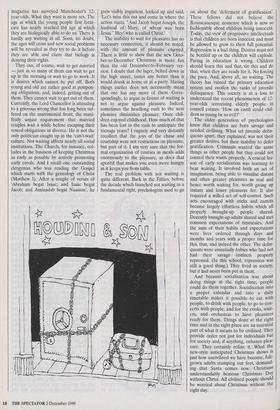CHRISTMAS COMES BUT ONCE A WEEK
Digby Anderson on a Britain in which people
just cannot postpone any pleasure: not crisps, not carols
CHRISTMAS WAS and still is regarded as a time of feasting. Traditionally, however, the feasting started on 25 December and went on to 2 February, the feast of Candle- mas. Now, the feasters just about last till after lunch on Boxing Day. When offered the most modest pre-dinner drinks on that evening, they haul up the white flag and holler, `Neff.' Christmas Day used to be the start of carol singing, Christmas carols that is; it was Advent carols that were sung before the 25th. Now the only singing you will hear after Christmas Day are those favourite refrains: 'I'll be glad when it's all over'; 'It will be good to get back to work' and think it goes on too long, don't you?' It's extraordinary. What these people want to get away from, apparently, are those pleasures of eating, drinking and self-indul- gence with which the age is supposed to be obsessed. One explanation is that the new Britons just can't take pleasure. They are not up to it.
Possibly. But the main reason they admit defeat on Boxing Day is that they started their festivities in late October, and have been at it — one must admit — intermit- tently ever since. The first shop windows were in October. The lights in my village high street went on last weekend. The office parties start in early December. More important than any of these, the thinking about Christmas, the planning of it, starts in October: 'What shall we have to eat?'; 'Who shall we have?'; 'Whose turn is it to have Auntie Joan, difficult Auntie Joan?'; Was it last year that we went back to the Mitchells, or did they come to us?' and 'What shall we give, and receive?' So well before Christmas Day, they are all exhausted and bored with drinks, turkeys, carols, presents, decorations and the whole business.
Why do they start the festivities so early? Because they have lost the ability to wait for Christmas. It used to be small children who grew so excited, who just could not wait for Santa and presents. It is now adults too. The English people can no longer wait for anything they enjoy. They can't wait for the football season: the game now goes on all year. They can't wait for strawberries in summer: they must have tasteless Californi- an ones at Christmas. And when they are bored with the strawberries, they can switch to Easter eggs which are on sale throughout the year. They can't wait for seasons. They can't wait to get tanned naturally in the summer by sunbathing. It's all beds and artificial stains. They can't wait for the right time and place during the day — any day. Observe any out-of-town shopping centre carpark. You will see rows of shell-suited bottoms stuck out behind car boots, as their owners root desperately among their recently purchased parcels to pull out the crisp packets and frantically tear at the top. They can't wait till they get home, let alone for a proper meal. Interestingly, a new sur- vey from the Children's Research Unit shows substantial variation across Europe in such matters. For instance, nearly all French, German and Italian children eat a lunch with their families at weekends, while only just over half of English children do so. The point is that when you eat on your own, you eat when you like. You do not have to wait. The English, it seems, along with the Americans, are particularly poor at waiting. Since all these nations are sub- ject to the same advertising and marketing, this suggests that not waiting is a cultural rather than an economic phenomenon. That is reinforced by other observations. The French, for instance, do not start cele- brating New Year's Day in mid-December or Bastille Day in May.
Nor do they usually drink on the streets. But watch English young people in the off- licence. Before they have so much as got out of the door, their itching, tattooed fin- gers are already hooked into the first ring- pull can of lager. As soon as it's off, the can is up to the lips, the contents downed in the street. Remember a society when only `common' children ate in the streets? Now being 'common' is common. And the lager- swilling teenagers do it alongside their elders and no betters. Their parents are busy scratching in the streets — their scratchcards, that is — up against the near- est wall. They are unable to wait even a few minutes to find they haven't won a fortune. Finally home, young, middle-aged and elderly, in a heap in front of the television, they all succumb to the greatest antidote for waiting of all, the channel-zapper. Plots, tunes, news stories get no chance to develop. All fall before the demand to have it now. And in the background is the con- tinual 'ping' of the microwave as someone pushes away at the button, eager to see if its contents might be ready ahead of those unendurably long five minutes.
They can't wait to fornicate either. Down and down go the ages of sexual activity, cheered on by adults passing laws in encouragement and hurling piles of con- doms at young people in support of their precocious urges. This week, there was a newspaper report on the magazine for 10- to-17-year-olds, TV Hits, which is said to give its little readers advice on oral sex techniques. Its editor explains that the magazine has surveyed Manchester's 12- year-olds. What they want is more sex. The age at which the young people first forni- cate has nearly reached the age at which they are biologically able to do so. There is hardly any waiting at all. Soon, no doubt, the ages will cross and new social problems will be revealed as they try to do it before they are able and claim that biology is denying their rights.
They can, of course, wait to get married — just as so many of them can wait to get up in the morning or wait to go to work. It is desires which cannot be put off. Both young and old are rather good at postpon- ing obligations, and, indeed, getting out of them. They cannot wait to get out of them. Currently, the Lord Chancellor is attending to a grievous wrong that has long been suf- fered on the matrimonial front, the mani- festly unjust requirement that married couples wait a while before escaping their vowed obligations in divorce. He is not the only politician caught up in the 'can't-wait' culture. Not waiting affects nearly all social institutions. The Church, for instance, col- ludes in the business of keeping Christmas as early as possible by actively promoting early carols. And I recall one outstanding clergyman who was reading the Gospel which starts with the genealogy of Christ (Matthew I). After a couple of verses of `Abraham begat Isaac; and Isaac begat Jacob; and Arninadab begat Naasson', he grew visibly impatient, looked up and said, `Let's miss this out and come in where the action starts. "And Jacob begat Joseph, the husband of Mary, of whom was born Jesus." Hey! who is called Christ.'
The inability to wait for pleasures has no necessary connection, it should be noted, with the amount of pleasure enjoyed, There is little to show that the new Octo- ber-to-December Christmas is more fun than the old December-to-February ver- sion. I doubt that the lager, belted down in the high street, tastes any better than it would drunk at home or at a party. Having things earlier does not necessarily mean that one has any more of them. Corre- spondingly, to argue in favour of waiting is not to argue against pleasure. Indeed, sometimes the headlong rush to the next pleasure diminishes pleasure. Once chil- dren enjoyed childhood. How much of that has been lost in the rush to anticipate the teenage years? I vaguely and very distantly recollect that the joys of the chase and courtship were not restrictions on pleasure, but part of it. I am very sure that the for- mal organisation of courses in meals adds enormously to the pleasure, as does that aperitif that makes you even more hungry as it keeps you from table.
The real problem with not waiting is quite different. Back in the Fifties, before the decade which launched not waiting as a fundamental right, psychologists used to go on about the 'deferment of gratification'. These fellows did not believe the Rousseauesque nonsense which is now so fashionable about children being innocent. Today, the view of progressive intellectuals is that children are born innocent and must be allowed to grow to their full potential. Repression is a bad thing. Desires must not be bottled up or the children will explode. Pacing in education is wrong. Children should learn this and that, do this and do that, when they are ready for it. No forcing the pace. And, above all, no waiting. The theory has ruined the primary education system and swollen the ranks of juvenile delinquency. This society is at a loss to understand the recent phenomenon of 12- year-olds terrorising elderly people in council estates. 'How on earth could chil- dren so young be so evil?'
The older generation of psychologists knew that children are born savage and needed civilising. What set juvenile delin- quents apart, they explained, was not their greater desires, but their inability to defer gratification. Criminals wanted the same things as other people but they could not control their wants properly. A crucial les- son of early socialisation was learning to bear waiting. It involved both an act of imagination, being able to visualise distant and often greater pleasures as real and hence worth waiting for, worth giving up instant and lesser pleasures for. It also required a willed act of self-control. Such acts encouraged with sticks and carrots became largely effortless habits which all properly brought-up people shared. Decently brought-up adults shared and met common expectations of timescales. And the sum of their habits and expectations were lives ordered through days and months and years with a proper time for this, that, and indeed the other. The delin- quents were essentially babies who had not had their savage instincts properly repressed. (In this school, repression was still a good thing.) They lived in society, but it had never been put in them.
And because socialisation was about doing things at the right time, people could do them together. Socialisation into a proper calendar and into a daily timetable makes it possible to eat with people, to drink with people, to go to con- certs with people, and for the cooks, wait- ers, and orchestras to have pleasures ready for them. Things done at the right time and in the right place are an essential part of what it means to be civilised. They provide order not just for individuals but for society and, if anything, enhance plea- sure. They certainly refine it. What the new-style anticipated Christmas shows is just how uncivilised we have become, full- grown adults stamping our feet, demand- ing that Santa comes now. Christians understandably bemoan Christmas Day without Christ. All civilised people should be worried about Christmas without the right day.











































































 Previous page
Previous page